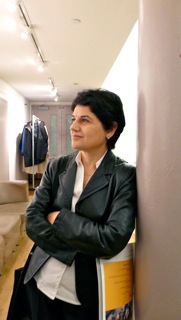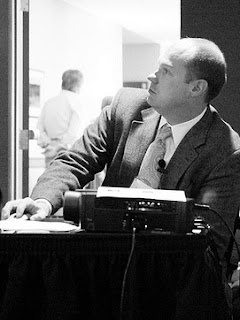Cathy Davidson Speaks About Teaching for the 21st Century at Fordham’s Faculty Technology Day 2012
 |
| Glenn Hendler, Cathy Davidson, and Micki McGee at Walsh Library |
Post written by Elizabeth Cornell
The average person in school today will change careers 4 to 6 times over the course of his or her lifetime.
Sixty-five percent of fifteen year olds alive today will work in careers that have not yet been invented.
These predictions, offered by Duke University professor Cathy Davidson, probably surprised many people in the audience at Walsh Library on Faculty Technology Day. Over a hundred of Fordham’s faculty, graduate students, and staff gathered to hear Davidson’s talk on May 22, 2012. She used the predictions to introduce what she sees as a major problem in education today: Most institutions and teaching methods still place their attention on training students to become proficient twentieth-century workers. As she writes in her book, Now You See It: How the Brain Science of Attention Will Transform the Way We Live, Work, and Learn (2011), “We have schooled a particular form of attention based on a particular set of values for the last one hundred years, with an emphasis on specialization, hierarchy, individual achievement, the ‘two cultures,’ linear thinking, focused attention to task, and management from top down.” These are what Davidson calls “keywords for an industrial age.”
 |
| William James and Frederick W. Taylor contributed to twentieth-century ideas about attention and work. |
Most institutions still teach and train students as though they will have one career, one specialty, and a small network of contacts. Bleak job climate aside, few American students plan to graduate from college and go looking for factory jobs or expect to manage a collection of workers focused on specific, repetitive tasks.
Our current social and work environments, as well as aspects of our learning environments, are much different. They require us to multitask. They are filled with distractions. We communicate with people all over the world, instantly and in full color with sound. We gather and exchange information in ways that were, in some cases, unknown even five years ago. Though some people claim multitasking and distractions are what’s “wrong” with our culture, Davidson sees them as opportunities for new ways of thinking, expression, building things, and creating knowledge. She warns that schools are not preparing their students for such a climate. Schools should be training students to participate in projects that require collaboration among individuals with different strengths and talents, not teaching students how to ace a multiple choice test or to work silently and alone, at a single, timed task.
In the digital age, students need to be proficient at following a workflow that is not task specific. Students should become efficient multitaskers, which can be achieved through remixes and mashups. They need to fully engage in process, such as publishing a good draft on a blog or wiki, and revising later based on feedback from the crowd. Learning to data mine is necessary, as well, and that includes “big data,” the visualization of data, and storytelling. Students need to develop blended skills, including an interdisciplinary familiarity with the front end and the back end (such as code) of things. Our differences are valuable. We should collaborate by difference and crowdsource our skills and ideas. These, Davidson says, are the keywords for the digital age.
Near the end of her talk, Davidson asked: “How are we training students for a Wikipedia world where people share knowledge for free, will change their jobs at least once but probably more times than that, and may work in a job that hasn’t been invented yet?” At that point, the audience knew the answer: We’re not. “What can we do to change our institutions?” Davidson knows this almost is a silly question to ask, but she nonetheless makes educators responsible: “It’s our job, not our administrations’, to make these changes.”
How do we begin? For Davidson, the most important thing we can do is change the focus of our attention: we’re not seeing what she calls “the gorilla in the room” because we have been told to look for something else. That is, we still value the old keywords, but they no longer apply to anyone’s needs today or in the future. Change can take place, as she writes in her book, if we see things differently, in a way “that’s based on multitasking our attention—not by seeing it all alone but by distributing various parts of a task among others dedicated to the same end.” Davidson closed her speech by urging us to “think, learn, and share” with each other so we can discover digital and non-digital solutions for learning and working together in a digital age.
Cathy Davidson’s visit on Faculty Technology Day was made possible by the Information Technologies Academic Computing Group, the Faculty Technologies Centers, the Arts and Sciences Deans and the Digital Humanities Working Group. Special thanks go to Associate Vice President for Academic Computing Fleur Eshghi for her work on this program.
Guest post by Elizabeth Cornell, Pre-Doctoral Fellow at Fordham University’s English Department.






